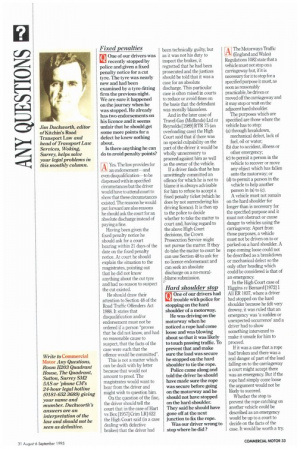Hard shoulder stop
Page 35

If you've noticed an error in this article please click here to report it so we can fix it.
One of our drivers had trouble with police for stopping on the hard shoulder of a motorway.
He was driving on the motorway when he noticed a rope had come loose and was blowing about so that it was likely to touch passing traffic. To prevent that and make sure the load was secure he stopped on the hard shoulder to tie the rope.
Police came along and told the driver he should have made sure the rope was secure before going on the motorway and he should not have stopped on the hard shoulder. They said he should have gone off at the next junction to fix the rope.
Was our driver wrong to stop where he did? The Motorways Traffic (England and Wales) Regulations 1082 state that a vehicle must not stop on a carriageway but, if it is necessary for it to stop for a specified purpose it must, as soon as reasonably practicable, be driven or moved off the carriageway and it may stop or wait on the adjacent hard shoulder.
The purposes which are specified are those where the vehicle has to stop: (a) through breakdown, mechanical defect, lack of fuel, oil or water; (b) due to accident, illness or other emergency; (c) to permit a person in the vehicle to recover or move any object which has fallen onto the motorway; or (d) to permit a person in the vehicle to help another person in (a) to (c).
A vehicle must not remain on the hard shoulder for longer than is necessary for the specified purpose and it must not obstruct or cause danger to vehicles using the carriageway-. Apart from those purposes, a vehicle must not be driven on to or parked on a hard shoulder. A rope coming loose could not be described as a breakdown or mechanical defect so the only other heading which could be considered is that of an emergency.
In the High Court case of Higgins vs Bernard [1972] 1 All ER 1037, where a driver had stopped on the hard shoulder because he felt very drowsy, it was ruled that an emergency was 'a sudden or unexpected occurrence' and a driver had to show something intervened to make it unsafe for him to proceed.
If it was a case that a rope had broken and there was a real danger of part of the load falling on to the carriageway a court might accept there was an emergency. But if the rope had simply come loose the argument would not be likely to succeed.
Whether the stop to prevent the rope catching on another vehicle could be described as an emergency would be up to a court to decide on the facts of the case. It would be worth a try.




















































































































